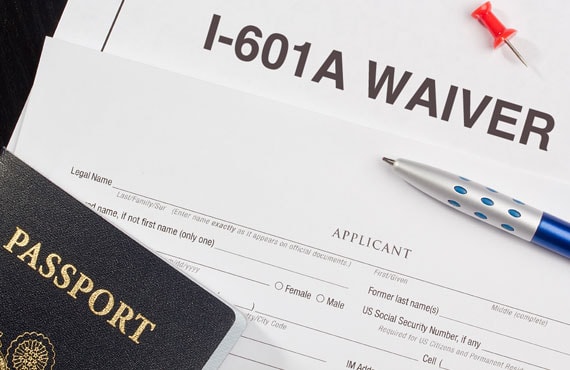I-601 WAIVER ATTORNEY IN PHOENIX
DON’T HESITATE TO REACH OUT TO US!
Our Law Firm is committed to becoming the best Law Firm for Latino, migrant, and Spanish speaking communities in Arizona.

As important as immigration is and always has been to the United States, the processes for applying for an immigrant visa are not always straightforward. In fact, there are so many forms, applications, waivers, and much more that any person seeking immigration might need to familiarize themselves with. Whether you are an immigrant or are a qualifying relative to an immigrant, it’s a good idea to consult with a Phoenix immigration attorney before proceeding.
At Ybarra Maldonado Law Group, we provide compassionate and qualified representation to immigrant visa applicants, family members, immediate relatives, and all others who need help navigating complex immigration laws. Our Phoenix immigration lawyers can help with an immigrant visa, waiver request, 601a provisional waiver, family separation, deportation proceedings, and much more. To schedule your free evaluation and establish an attorney client relationship with our firm, please call 602-910-4040 or fill out our online intake form.
What Is an I-601 Waiver?

Maybe you’ve been denied either a visa or another immigration benefit. In these cases, you might be eligible for a waiver through the process of I-601. These I-601 waivers, also called Application for Waiver of Grounds of Inadmissibility, are sometimes used by immigrating applicants in order to apply for a visa. They also use these forms when filing for an adjustment of status or other immigration benefits for which they currently do not qualify.
Applicants deemed ineligible for a visa or benefits can submit this form to the United States Citizenship and Immigration Services (USCIS) to request that their “grounds of inadmissibility” be waived. This form is not to be confused with the I-602 waiver, which is a waiver with subtle differences.
NOTE: The USCIS has recently changed their interpretation of the grounds of inadmissibility. Read our related blog post for the latest changes.
Who Can File an I-601 Waiver?
Applicants who may file a form I-602 are listed below.
- Adjustment of status to lawful permanent resident status
- Applicants for K visa, V nonimmigrant visa who are outside of the United States, have had their visa interview, and were found inadmissible during that interview
- Temporary protected status visa applicants
- Adjustment of status applicants under the Nicaraguan Adjustment and Central American Relief Act 202 or Haitian Refugee Immigration Fairness Act 902
- Immigrant visa or adjustment of status applicants as a Violence Against Women Act self-petitioner or child of a VAWA petitioner (note that you must meet all VAWA requirements to qualify)
- Adjustment of status applicants based on T nonimmigrant status
- Adjustment of status applicants as Special Immigrant Juvenile on an approved Form I-360
What Are Grounds of Inadmissibility?
All grounds of inadmissibility from the above applicants are listed below.
- Health related grounds
- Criminal grounds
- Immigration fraud or misrepresentation
- Membership in a totalitarian party
- Alien smuggler
- Subject to civil penalties
- A 3-year or 10-year bar because of previous unlawful presence in the US
- Those listed in INA 212A, such as health, criminal background, security, illegally entering the country, labor certification, or documentation requirements
- Those listed for adjustment of status applicants
- Previously removed aliens
- Previous immigration violations and unlawful entry
How Long Does I-601 Take to Process?
In terms of processing schedules, USCIS and the Department of State are working closely together to ensure that the approval of a provisional illegal presence waiver application occurs close to the planned immigrant visa interview overseas. An I-601A waiver application typically takes 4 to 6 months to process.
In addition, when the provisional illegal presence waiver is approved and the applicant submits the requisite immigrant visa processing paperwork to DOS, DOS expects that the applicant will be scheduled for an immigrant visa interview within 2 to 3 months.
How Does the USCIS Decide Whether or Not to Approve an I-601 Waiver?
Notably, many individuals are required to submit a good moral character letter for immigration. This gives USCIS more personal information about the applicant before they make their decision. While there are numerous reasons why an applicant may be declared inadmissible, a few instances of scenarios in which USCIS will accept a 601 waiver are provided below.
Health Grounds
If applicants do not have documentation of having had all needed vaccines, they may be declared ineligible. However, USCIS may provide a waiver of vaccine inadmissibility if the following conditions are met.
- The applicant receives all the required vaccinations
- Qualified medical professional vouches that the vaccine is not medically appropriate
- The Secretary of the Department of Homeland Security finds that forcing the immunization would be incompatible with the applicant’s religious or moral convictions.
Membership in a Totalitarian Party
If a candidate is or has been associated with the Communist Party or other totalitarian party, he or she may be considered ineligible. However, if they fulfill the following criteria, they may be given a waiver.
- The candidate is engaged to a K visa applicant or is the spouse, parent, son, daughter, brother, or sister of a U.S. citizen or a spouse, son, or daughter of an alien legally admitted for permanent resident status.
- They are deemed not a threat to the United States.
- The waiver is sought for humanitarian reasons, to maintain family bonds, or to serve the public interest in some other way.
- The applicant’s unsuitability as a permanent resident, in the view of the immigration officer, is offset by social and humanitarian factors.
Misrepresentation
When applying for a visa, admission to the United States, or any other benefit under the Immigration and Nationality Act, an applicant is inadmissible if he or she willfully lied about or falsified any substantial fact.
However, if the candidate can demonstrate the following, he or she may be given a waiver.
- A US citizen, lawful permanent resident, or the K visa petitioner would suffer extreme hardship as a result of the refusal of admission.
- The applicant’s unsuitability as a resident, in the perspective of the immigration officer, is offset by social and humanitarian factors.
Unlawful Presence
If a foreign individual has remained unlawfully in the United States for more than 180 days but less than a year and then left voluntarily before removal procedures were launched against them, he or she is ineligible for at least three years. A waiver may be given to a non-resident who meets the following criteria.
- Refusal to admit a U.S. citizen or lawful permanent resident spouse or parent, or the K visa petitioner, would result in extreme hardship to one or more of those individuals.
- According to the immigration officer handling the case, the undesirability of the applicant is outweighed by social and human factors.
What Is the Difference Between 601 and 601A?
These two waivers are fairly similar, but they have one notable difference: the location of the applicant. A form I-601 is intended for those individuals who are outside the United States. Form I601a, on the other hand, is meant for those individuals inside the United States.
For the I-601 waiver, USCIS reconsiders the facts regarding the actions that rendered the applicant ineligible, balancing them against the burden their exclusion causes their resident spouse or parent. The higher the burden of proof for the burden that would be generated, the more serious the inadmissibility category.
The I-601A waiver has a somewhat different methodology. Those who are illegal immigrants or who have overstayed their visa must demonstrate that being separated from their U.S. citizen spouse, children, or parents will cause them significant hardship in order to qualify for this waiver.
In effect, this waiver permits U.S. citizens’ close family members to apply for an immigrant visa without needing to leave the country first. However, there are several conditions for the I-601A that will force the applicant to depart the United States. In essence, the conditions state that even if the applicant’s waiver is approved, they must still leave the country to interview with a consular officer.
Who Qualifies for a 601A?

Below, we list the qualifications for a form I 601a.
- Physically, you are inside the United States.
- You are at least 17 years old at the time of filing.
- You have an immigrant visa case currently pending with the DoS.
What Is the Purpose of I-601A?
If you have outstayed a visa or resided in the United States without a green card, a valid visa, or U.S. citizenship, you can utilize this form to reduce or waive the period you are barred from attempting to enter the country.
Is Premium Processing Available?
No. However, applicants may request expedited adjudication of their provisional unlawful presence waiver in conjunction with the updated USCIS guidelines.
Contact a Phoenix Immigration Attorney Today
At Ybarra Maldonado Law Group, we take pride in representing those who apply for an immigrant visa, those who struggle with the complexities of immigration law, and immigrants in general. As one of the premier immigration law firms in Phoenix, we’re here to offer help in securing proper documentation for you and your family. To schedule a free consultation and establish a confidential relationship with an attorney, please contact our office. Call today at 602-910-4040 or fill out our online intake form.

